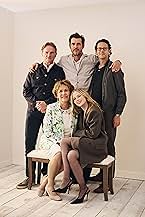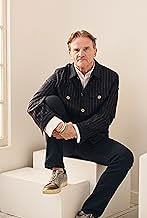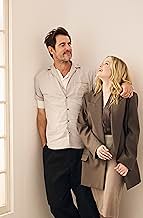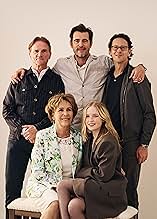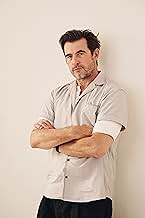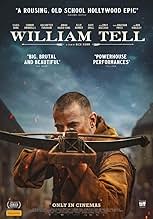Im 14. Jahrhundert will König Albrecht seine Macht in der Schweiz ausweiten, doch seine Herrschaft stößt auf Widerstand. Der Jäger Wilhelm Tell wird in einen Freiheitskampf hineingezogen und... Alles lesenIm 14. Jahrhundert will König Albrecht seine Macht in der Schweiz ausweiten, doch seine Herrschaft stößt auf Widerstand. Der Jäger Wilhelm Tell wird in einen Freiheitskampf hineingezogen und wird zum Anführer einer historischen Rebellion.Im 14. Jahrhundert will König Albrecht seine Macht in der Schweiz ausweiten, doch seine Herrschaft stößt auf Widerstand. Der Jäger Wilhelm Tell wird in einen Freiheitskampf hineingezogen und wird zum Anführer einer historischen Rebellion.
- Regie
- Drehbuch
- Hauptbesetzung
- Auszeichnungen
- 1 Nominierung insgesamt
Zusammenfassung
Reviewers say 'William Tell' is lauded for its strong performances, stunning cinematography, and historical authenticity. The narrative of rebellion against tyranny resonates, though dialogue and pacing receive mixed feedback. Some find the script theatrical, and the middle section drags. Historical accuracy and character portrayals are debated. Despite these issues, the film's epic scope and emotional depth make it a compelling historical drama.
Empfohlene Bewertungen
The movie is pretty poor, overall. But that's not what I'm here to flag... by far the most jarring aspect is they've lifted Al Pacino's Peach With Inches speech from Any Given Sunday, in parts practically verbatim, for Tell's rousing the troops before battle. WTF is that all about??
Not even a little bit, a nod to it, huge chunks.
"In any fight, it's the man whose willing to die..."
"You gotta look at the person sitting next to you, look in the eye and ask that person are you willing to die for me..." but delivered in the least inspiring, spine chilling way that it should make Pacino cry himself to sleep.
Not even a little bit, a nod to it, huge chunks.
"In any fight, it's the man whose willing to die..."
"You gotta look at the person sitting next to you, look in the eye and ask that person are you willing to die for me..." but delivered in the least inspiring, spine chilling way that it should make Pacino cry himself to sleep.
It lacks ...power.
Cinematografic it is a beautiful film. Scenery is ok. Actors are good. Story is good. But it lacks some ...power. And that's on the director. This could have been another Braveheart but the dialogs are tame and i miss the hero on a pedastool. Can't exactly point it out but it is not just not there. Perhaps with another director this could have been a great movie.
Cinematografic it is a beautiful film. Scenery is ok. Actors are good. Story is good. But it lacks some ...power. And that's on the director. This could have been another Braveheart but the dialogs are tame and i miss the hero on a pedastool. Can't exactly point it out but it is not just not there. Perhaps with another director this could have been a great movie.
Had to turn it off after so many sea voyages which appeared to be made out as a if they were on the North Sea. Between Switzerland and Austria? Awful. While this was dreadful and mind numbing even as a bit of background noise it became too much to cope with. Not sure why reviews have to be so long so again I'll just say don't bother. Walk your dog for the 5th time today go to the toilet, even if you don't need to. You can read the ingredients on the shampoo bottle, It'll be more entertaining even if you know them word for word. Then move onto the shower gell. Enough words almost now. It's awful cheers.
I watched the world premiere of William Tell at the Toronto International Film Festival (2024).
The presenter of the festival had said before the movie, "they don't make movies like this anymore". I assumed that was a positive thing.
Unfortunately, it really wasn't. The biggest issue of the movie was the language used.
This is a 14th-century period piece that involved the Swiss and Austrians. But for whatever reason the dialogue was written in something that sounded like a high-schooler's approximation of Victorian English.
According to the director, he wrote the dialogue to have language unique to the film. Maybe to assist in some sense of believability within this world. Instead the film was often hard to follow. Character motivations were lost in the flowery, disjointed language.
That being said - the cast did their absolute best with the film. Golshifteh Farahani, Connor Swindells, Rafe Spall, and Ellie Bamber were standouts.
Don't go to see the film for Ben Kingsley - he was barely in it and his performance felt completely phoned in.
If you're okay with 2-hours of mindlessness as you watch beautiful scenery and cool fight scenes - I think there is enough to enjoy.
The movie set up a sequel. I do hope it can be made, and some changes to how dialogue and character interactions are done will be made.
The presenter of the festival had said before the movie, "they don't make movies like this anymore". I assumed that was a positive thing.
Unfortunately, it really wasn't. The biggest issue of the movie was the language used.
This is a 14th-century period piece that involved the Swiss and Austrians. But for whatever reason the dialogue was written in something that sounded like a high-schooler's approximation of Victorian English.
According to the director, he wrote the dialogue to have language unique to the film. Maybe to assist in some sense of believability within this world. Instead the film was often hard to follow. Character motivations were lost in the flowery, disjointed language.
That being said - the cast did their absolute best with the film. Golshifteh Farahani, Connor Swindells, Rafe Spall, and Ellie Bamber were standouts.
Don't go to see the film for Ben Kingsley - he was barely in it and his performance felt completely phoned in.
If you're okay with 2-hours of mindlessness as you watch beautiful scenery and cool fight scenes - I think there is enough to enjoy.
The movie set up a sequel. I do hope it can be made, and some changes to how dialogue and character interactions are done will be made.
Hmmm. Never before have I heard anyone proudly declare "We are Swiss" in quite such an underwhelming manner before, and that rather sums up the lacklustre performance of Claes Bang as the title character in this verbose crossbow chronology. Traumatised by his experiences in the Crusade, he's now not a natural rebel but is instead content to live peaceably with his wife and son. When he comes to the rescue of a stranger whose wife had just been raped and murdered by the occupying troops of the King of Austria (Sir Ben Kingsley) his former valiance is rekindled and releases all manner of hell on his unprepared, unarmed and unsuspecting people. Pursued by the maniacal "Gessler" (Connor Swindell) and his blonde henchman "Stussi" (Jake Dunn), he has to rediscover his skill with the arrow, and yes - there's the legendary scene with the apple and the boy's head! There is some stunning Alpine photography mingled in with the pretty obvious CGI, and to be fair to it there are plenty of action scenes as Tell and his rapidly increasing circle of friends proves to be quite adept at reducing their foes to wriggling corpses. Sir Ben has managed to fish out his eye patch from "The Last Legion" (2007) but like Sir Jonathan Pryce, he doesn't really feature enough to make much more than a few cameo appearances to add a little bit of Thespian gravitas to this rather sterile and flat history. The characters are really lacking in charisma in this film and the long-winded dialogue and charm-free efforts from all but, perhaps, Dunn - think a weedier version of "Stamper" from "Tomorrow Never Dies" (1997) just don't really resonate much at all. There's plenty of attention to the creative detail with the costumes and castles all fitting the bill nicely but it's probably half an hour longer than it needs to be and screams sequel at us at it's all rather rushed end.
Wusstest du schon
- WissenswertesDespite being a national hero in Switzerland, there is no concrete historical evidence that William Tell ever existed.
The earliest written account of the story appears in a 15th-century chronicle called the "White Book of Sarnen", more than a century after the events are supposed to have taken place.
Furthermore, the act of the hero shooting an apple from his son's head stems from the saga of Toko, who was a servant of the Danish King Harald Bluetooth, who died in 985. Likewise, Toko's story was written down more than two hundred years later, in the epic tale "Gesta Danorum".
Many historians view William Tell as a purely legendary figure, though his story was deeply embedded in Swiss national identity by the time of its writing.
- PatzerThe various castles are shown in their modern forms. Specifically, they have a large number of windows. These were all cut several centuries after the period in which the story is set, when castles were no longer required to be fortresses.
- VerbindungenVersion of Guillaume Tell et le clown (1898)
Top-Auswahl
Melde dich zum Bewerten an und greife auf die Watchlist für personalisierte Empfehlungen zu.
- How long is William Tell?Powered by Alexa
Details
- Erscheinungsdatum
- Herkunftsländer
- Offizieller Standort
- Sprache
- Auch bekannt als
- Guillermo Tell
- Drehorte
- Produktionsfirmen
- Weitere beteiligte Unternehmen bei IMDbPro anzeigen
Box Office
- Bruttoertrag in den USA und Kanada
- 43.088 $
- Eröffnungswochenende in den USA und in Kanada
- 26.554 $
- 6. Apr. 2025
- Weltweiter Bruttoertrag
- 680.624 $
- Laufzeit2 Stunden 14 Minuten
- Farbe
- Sound-Mix
- Seitenverhältnis
- 2.39 : 1
Zu dieser Seite beitragen
Bearbeitung vorschlagen oder fehlenden Inhalt hinzufügen



